Latest Innovations in Autonomous AI Customer Service

Autonomous AI customer care is revolutionizing customer service by delivering faster, smarter, and more personalized solutions. By 2025, 80% of companies will adopt AI-powered chatbots, transforming how businesses interact with customers. Artificial intelligence enhances customer engagement by understanding preferences and providing tailored experiences. For example, Sobot’s AI Chatbot operates 24/7, resolving queries efficiently while improving customer trust and satisfaction. This shift not only reduces service costs by up to 30% but also boosts agent productivity. As Sobot continues to evolve, it promises to redefine customer experiences and set new standards for operational excellence.
The Role of Autonomous AI in Customer Service
Defining Autonomous AI in Customer Care
Core functionalities and capabilities
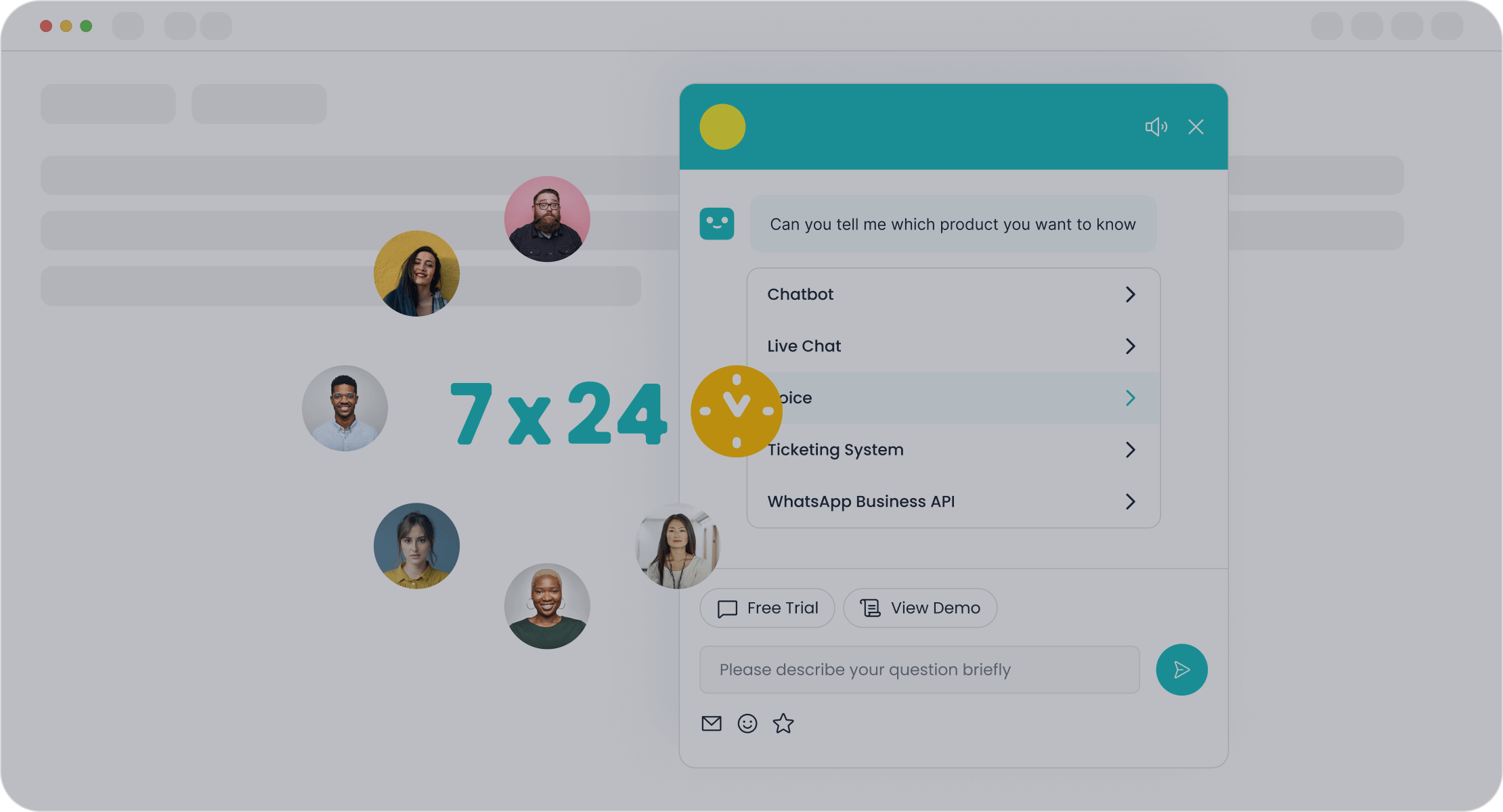
Autonomous AI in customer care refers to systems that independently manage customer interactions with minimal human intervention. These systems excel in tasks like answering queries, resolving issues, and providing personalized recommendations. Unlike traditional AI, autonomous AI adapts to changing customer needs in real time. For instance, Sobot’s AI Chatbot operates 24/7, offering multilingual support and leveraging a knowledge base to deliver accurate responses. This adaptability ensures faster resolutions and improved customer satisfaction.
Key functionalities include omnichannel support, which allows seamless communication across platforms like WhatsApp and SMS. Additionally, autonomous AI uses advanced data analytics to understand customer behavior, enabling hyper-personalized experiences. These capabilities make it a cornerstone of modern customer service trends.
How it differs from traditional AI systems
Autonomous AI stands apart due to its autonomy and adaptability. Traditional AI systems often require manual updates and predefined rules. In contrast, autonomous AI evolves by learning from interactions, much like self-driving cars adjust to road conditions. This adaptability allows it to handle complex scenarios without constant human oversight.
For example, Sobot’s AI Chatbot not only automates routine tasks but also assists human agents by triaging queries. This hybrid approach enhances efficiency and ensures customers receive timely, accurate support. Autonomous AI’s ability to make decisions independently transforms customer engagement, setting it apart from older AI models.
Why Autonomous AI is Essential
Benefits for businesses and customers
Autonomous AI delivers significant benefits for both businesses and customers. Companies using AI report a 35% reduction in customer service costs and a 32% increase in revenue. These systems improve agent productivity by automating repetitive tasks, allowing human agents to focus on complex issues. For customers, AI ensures faster response times and personalized experiences, fostering trust and loyalty.
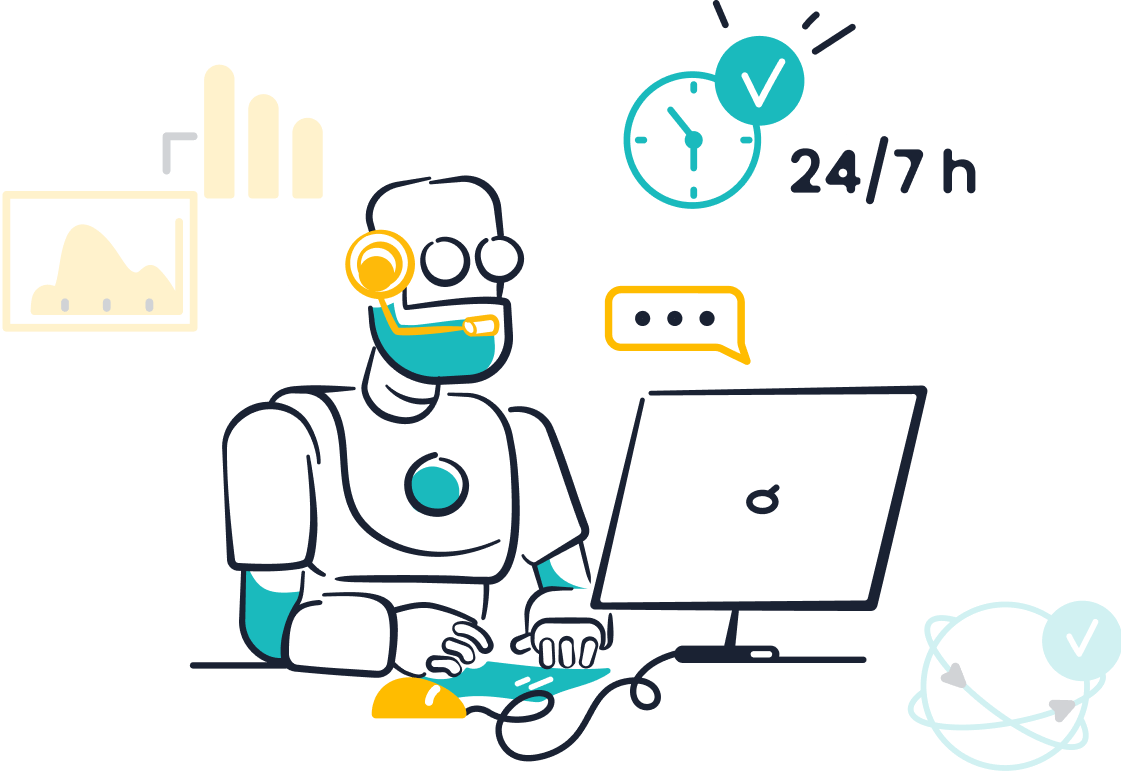
Sobot’s AI Chatbot exemplifies these advantages. It reduces operational costs by handling multiple inquiries simultaneously and boosts conversions by 20% through proactive customer service. By integrating AI-driven automation, businesses can enhance customer satisfaction while achieving operational efficiency.
Addressing challenges in modern customer service
Modern customer service faces challenges like high query volumes and fragmented communication channels. Autonomous AI addresses these issues by providing 24/7 availability and omnichannel integration. Companies using AI report a 37% drop in first response times, ensuring customers receive prompt assistance.
Sobot’s solutions, such as its AI Chatbot, tackle these challenges effectively. By automating responses and unifying communication channels, Sobot enables seamless customer interactions. This approach not only improves service quality but also aligns with emerging trends in AI customer service, ensuring businesses stay ahead in a competitive landscape.
Key Trends in Autonomous AI Customer Care in 2025
Hyper-Personalization in Customer Experience
AI-driven tailored interactions
AI is revolutionizing customer service by enabling hyper-personalization. It uses real-time data analysis to understand customer preferences and deliver tailored solutions. For example, AI can analyze purchase history and browsing behavior to recommend products that align with individual needs. This shift from reactive to proactive support ensures customers feel valued and understood.
By 2025, hyper-personalized experiences will generate up to 40% more revenue for businesses compared to generic approaches. Companies adopting AI-driven automation can anticipate customer needs, enhancing satisfaction and loyalty. Sobot’s AI Chatbot exemplifies this trend by offering multilingual support and proactive messaging, ensuring every interaction feels personal and meaningful.
Real-world examples of hyper-personalized services
Many companies are already leveraging AI to create personalized experiences. For instance, retail brands use AI to send tailored promotions based on customer preferences. According to McKinsey, 80% of consumers are more likely to purchase from businesses offering personalized experiences. This highlights the importance of hyper-personalization in driving customer engagement and sales.

Sobot’s solutions empower businesses to deliver such experiences. Its AI Chatbot integrates seamlessly across platforms, providing consistent and personalized service. This approach not only improves customer satisfaction but also boosts conversion rates by 20%.
Emotional AI for Enhanced Customer Interactions
Understanding and responding to customer emotions
Emotional AI is transforming customer interactions by enabling systems to detect and respond to emotions. It analyzes voice tone, text sentiment, and facial expressions to gauge customer feelings. This capability allows businesses to address concerns empathetically, fostering trust and loyalty.
Research shows that two-thirds of customers are more likely to return to businesses that care about their emotional state. By integrating emotional AI, companies can enhance customer satisfaction scores by 20%. Sobot’s AI solutions help businesses achieve this by combining automation with empathy, ensuring every interaction feels human.
Building empathy in automated systems
Building empathy into AI systems involves designing responses that resonate with customers. For example, when a customer expresses frustration, the system can acknowledge their feelings and offer solutions. This approach bridges the gap between automation and human touch.
Forrester Research found that elite brands evoke 29 positive emotions for every negative one. Sobot’s AI Chatbot incorporates these principles, creating interactions that leave customers feeling heard and valued. This balance of efficiency and empathy sets a new standard for customer service.
Generative AI Transforming Customer Support
Dynamic response generation for customer queries
Generative AI is reshaping customer support by creating dynamic, context-aware responses. Unlike traditional systems, it generates unique replies tailored to each query. This capability reduces response times and enhances the overall customer experience.
By 2025, 80% of customer service organizations will use generative AI to boost productivity and engagement. Sobot’s AI Chatbot leverages this technology to provide accurate, real-time answers, ensuring customers receive the support they need without delays.
Applications in tools like Sobot's Chatbot
Generative AI has practical applications across industries. For example, BloomsyBox used it to create an interactive chatbot for their Mother’s Day campaign, boosting customer engagement. Similarly, Sobot’s AI Chatbot uses generative AI to triage queries and assist agents, improving efficiency by 70%.
This technology also enhances agent confidence. A study revealed that 84% of agents reported positive impacts from generative AI tools. By integrating these capabilities, Sobot helps businesses streamline operations and deliver exceptional customer service.
Omnichannel Integration for Seamless Support
Unified customer experiences across platforms
Omnichannel integration ensures your customers enjoy a seamless experience across all communication platforms. Whether they reach out via email, live chat, or social media, their interactions flow smoothly without interruptions. This approach eliminates the frustration of repeating information, creating a consistent and efficient customer journey.
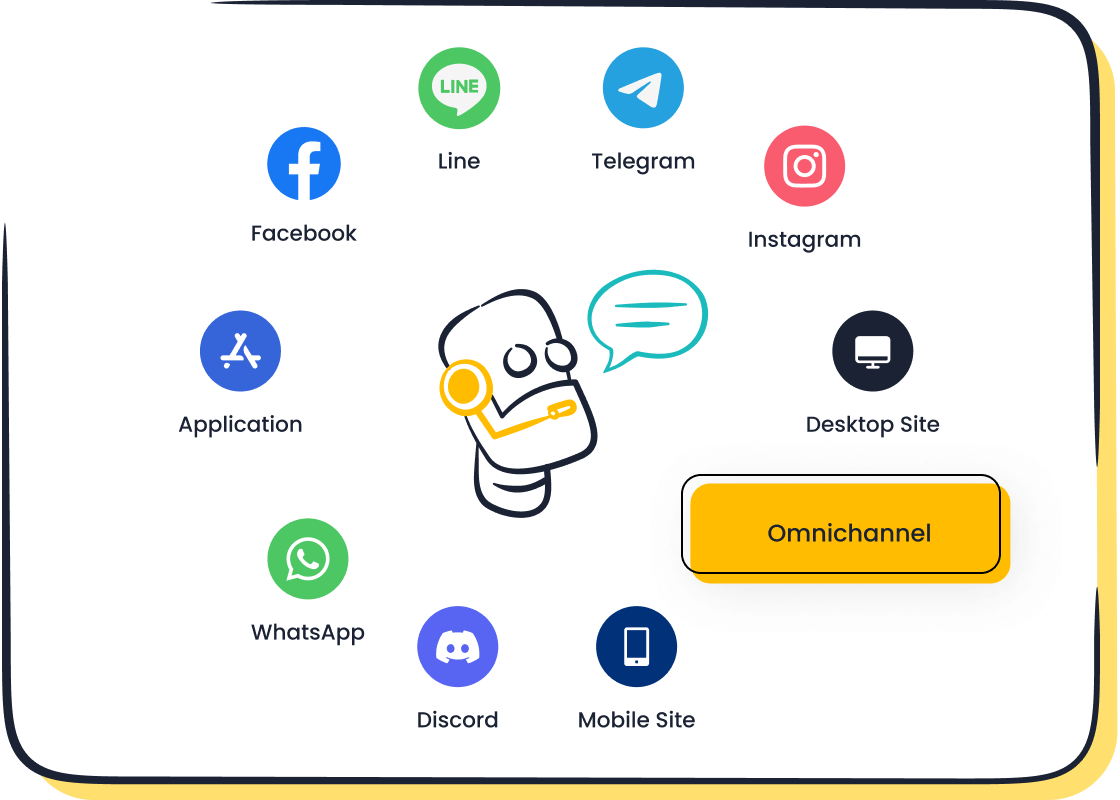
For example, integrating various channels allows you to track customer interactions in real time. If a customer starts a conversation on WhatsApp and later switches to email, the system retains the context. This continuity enhances the overall customer experience and builds trust. Businesses adopting omnichannel support report fewer complaints about fragmented communication and higher satisfaction rates. Sobot’s AI Chatbot excels in this area by unifying customer interactions across platforms like WhatsApp, SMS, and live chat, ensuring every touchpoint feels connected.
Benefits of integrating communication channels
Integrating communication channels offers several advantages. First, it reduces operational inefficiencies by centralizing customer data. This makes it easier for your team to access information and provide faster resolutions. Second, it improves customer satisfaction by delivering consistent and personalized service. Finally, it boosts productivity by streamlining workflows.
The shift toward omnichannel support is a key trend in AI-powered customer service. It addresses common challenges like fragmented communication and inconsistent responses. By adopting this approach, you can enhance your service quality and stay ahead of customer service trends.
Advanced Self-Service Solutions
AI-powered knowledge bases and virtual agents
AI-powered knowledge bases and virtual agents empower your customers to find answers independently. These tools use automation to provide instant solutions, reducing the need for human intervention. For instance, AI can analyze customer queries and suggest relevant articles or FAQs, saving time for both parties.
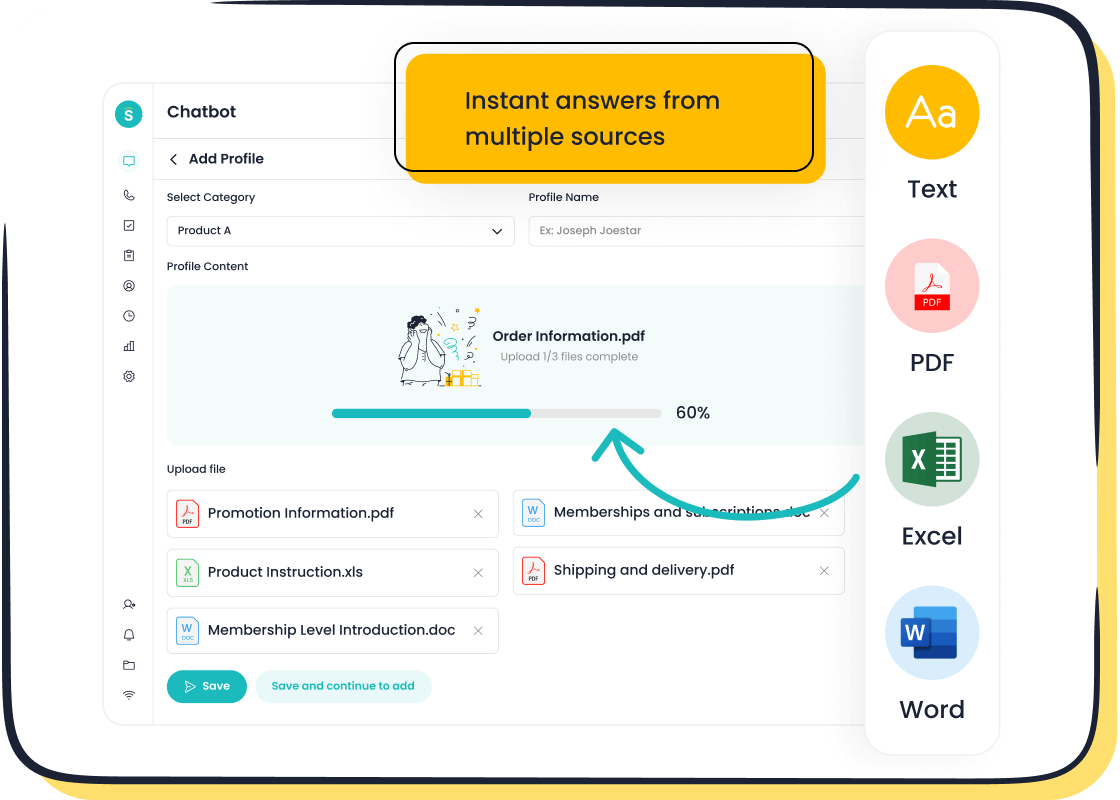
Sobot’s AI Chatbot leverages a robust knowledge base built from various sources like PDFs and text snippets. This ensures accurate and timely responses, even for complex inquiries. Businesses using AI-powered self-service tools report significant improvements in metrics like First Contact Resolution and Average Handle Time. These solutions not only enhance efficiency but also improve customer satisfaction.
Empowering customers to resolve issues independently
Self-service solutions give your customers the tools they need to solve problems on their own. This approach fosters a sense of empowerment and reduces dependency on support agents. For example, virtual agents can guide users through troubleshooting steps or provide updates on order statuses.
Clients implementing AI-driven self-service solutions have seen remarkable results. One client improved First Contact Resolution by 78%, leading to higher satisfaction scores. These tools also reduce wait times, ensuring customers receive help when they need it. Sobot’s AI Chatbot exemplifies this trend by offering 24/7 availability and multilingual support, making it easier for customers to resolve issues independently.
Practical Applications of Autonomous AI in Customer Service
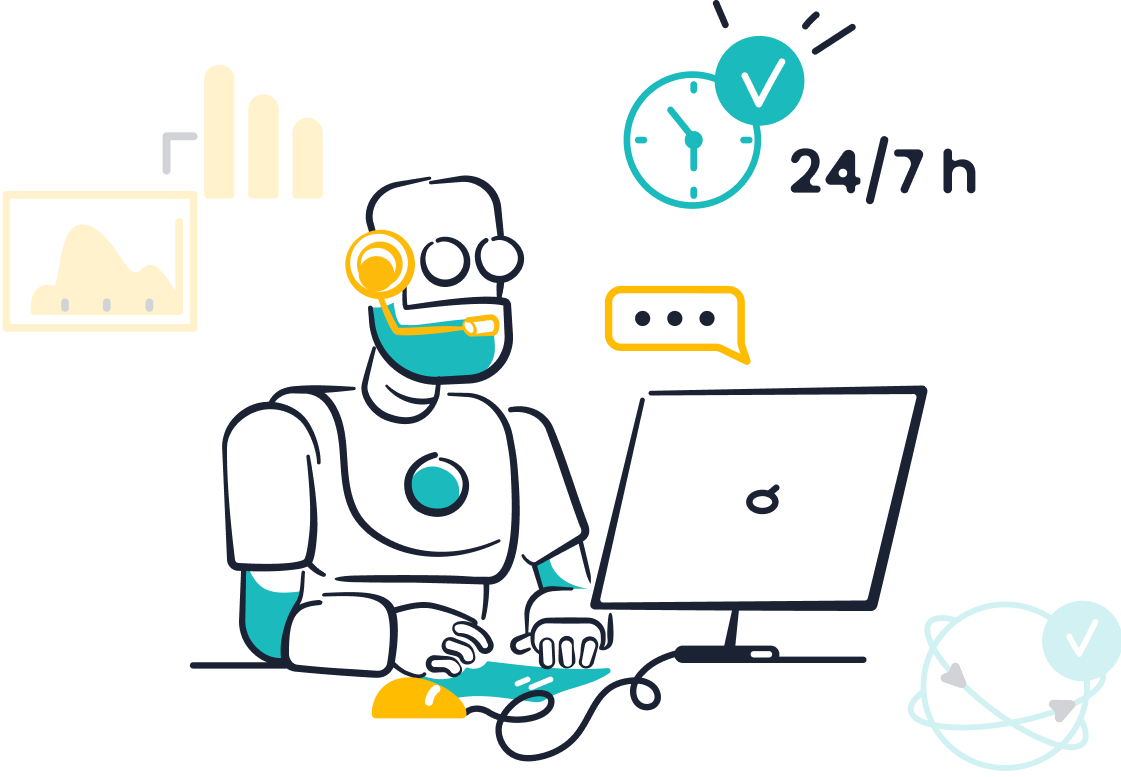
Real-World Use Cases Across Industries
Examples from retail, healthcare, and finance
Autonomous AI customer care is transforming industries by addressing unique challenges and enhancing customer service. In retail, AI-powered chatbots assist customers with product recommendations, order tracking, and returns. For example, a chatbot can analyze purchase history to suggest complementary items, improving engagement and driving sales. In healthcare, AI systems streamline appointment scheduling and provide instant answers to common medical queries, reducing wait times for patients. Meanwhile, in finance, AI enhances fraud detection and assists customers with account inquiries, ensuring secure and efficient service.
A recent study revealed that 80% of companies are using AI to improve customer experience, while 35% are leveraging it to boost agent efficiency. These statistics highlight the growing reliance on AI in customer support across various sectors.
| Statistic | Description |
|---|---|
| 80% of companies | are using AI to improve customer experience (Gartner, 2023). |
| 35% of organizations | are using AI to improve customer service agent efficiency in 2024 (IBM Global AI Adoption Index). |
Success stories, including Sobot's collaboration with OPPO
Sobot's collaboration with OPPO demonstrates the power of autonomous AI in customer care. OPPO faced challenges during peak shopping periods, including high query volumes and long wait times. By implementing Sobot's AI Chatbot, OPPO automated repetitive queries, allowing human agents to focus on complex issues. This integration achieved an 83% chatbot resolution rate and a 94% positive feedback rate. Additionally, OPPO optimized its knowledge base with Sobot's AI, reducing maintenance efforts by 90%. These results highlight how AI-driven customer experience solutions can enhance efficiency and customer satisfaction.
Business Benefits of AI-Driven Customer Care
Cost savings and operational efficiency
AI in customer service delivers significant cost savings and operational efficiency. Businesses using AI report a 35% reduction in service costs by automating repetitive tasks and streamlining workflows. For example, Sobot's AI Chatbot operates 24/7, handling multiple inquiries simultaneously without additional staffing costs. This reduces expenses while maintaining high service quality. Moreover, AI-powered tools improve agent productivity by triaging queries and providing real-time assistance, enabling faster resolutions.

Improved customer satisfaction and loyalty
AI customer service enhances customer satisfaction by delivering faster, more personalized support. Customers value quick responses and tailored solutions, which AI systems excel at providing. For instance, Sobot's AI Chatbot uses hyper-personalization to anticipate customer needs, fostering trust and loyalty. Research shows that businesses adopting AI-driven customer experience solutions see a 20% increase in customer satisfaction scores. By integrating AI, you can create seamless interactions that keep customers coming back.
Balancing Automation and Human Interaction

The Hybrid Model in Customer Service
Combining AI and human agents for optimal results
AI has transformed customer service by automating repetitive tasks and providing instant responses. However, combining AI with human agents creates a hybrid model that delivers the best results. AI excels at handling routine queries, while human agents focus on complex or emotional issues. This balance ensures efficiency without sacrificing the personal touch customers value.
For example, Sobot’s AI Chatbot can resolve up to 83% of inquiries autonomously, as seen in its collaboration with OPPO. When AI handles simple tasks, human agents have more time to address unique challenges. This approach improves customer satisfaction and builds trust by ensuring every interaction meets the customer’s needs.
When to involve human intervention
Knowing when to involve human agents is crucial in AI customer service. AI works well for straightforward questions, but human intervention becomes essential for sensitive or complicated issues. For instance, a customer disputing a billing error may require empathy and detailed explanations that only a human can provide.
Sobot’s solutions allow seamless transitions between AI and human agents. If the AI Chatbot detects frustration or confusion, it escalates the issue to a human agent. This ensures customers receive the right level of support, enhancing their overall experience.
Ethical and Practical Considerations
Addressing AI bias and ensuring transparency
AI systems must operate fairly and transparently to maintain customer trust. Bias in AI can lead to unfair treatment, damaging your brand’s reputation. To address this, you should regularly audit AI algorithms and train them on diverse datasets. Transparency also plays a key role. Customers should understand how AI makes decisions and why certain actions are taken.
Sobot prioritizes ethical AI practices by designing systems that focus on trust and privacy. Its AI Chatbot provides clear explanations for its actions, ensuring customers feel confident in the service they receive.
Maintaining data privacy and security
Data privacy and security are critical in AI customer service. Customers share sensitive information, and protecting it should be your top priority. Implementing encryption, secure servers, and strict access controls can safeguard customer data. Additionally, complying with regulations like GDPR ensures your practices align with global standards.
Sobot’s AI solutions emphasize data security. With a system stability rate of 99.99%, Sobot ensures customer information remains safe. This commitment to privacy not only protects your customers but also strengthens their trust in your service.
Future Outlook for Autonomous AI in Customer Service
Emerging Trends in AI-Driven Customer Care
Predictions for the next wave of AI advancements
The future of AI in customer service looks promising, with several exciting trends shaping the industry. Businesses are increasingly investing in AI training for their customer experience teams. This ensures that employees can effectively use AI tools to enhance service quality. Advancements in conversational AI and sentiment analysis are also gaining momentum. These technologies allow systems to understand customer emotions better, leading to more empathetic interactions.
Generative AI is another game-changer. It creates dynamic, context-aware responses, making customer interactions feel more natural. Additionally, the demand for self-service options continues to grow. Customers prefer solving issues independently, and AI-powered tools like Sobot’s Chatbot make this possible. Omnichannel support is also on the rise, enabling seamless communication across platforms. Business leaders increasingly believe that AI can outperform human agents in delivering efficient and consistent service.
The role of AI in shaping customer service strategies
AI is no longer just a tool; it’s a strategic asset. It helps businesses design customer service strategies that prioritize efficiency and personalization. For example, AI analyzes customer data to identify patterns and predict future needs. This allows you to offer proactive solutions, enhancing the overall customer experience.
Sobot’s AI Chatbot exemplifies this approach. It operates 24/7, providing multilingual support and reducing response times. By integrating AI into your strategy, you can build trust with your customers and stay ahead of industry trends. AI-driven strategies not only improve service quality but also boost customer loyalty and satisfaction.
Preparing Businesses for the Future
Adapting to evolving technologies and customer expectations
To stay competitive, you must adapt to evolving technologies and changing customer expectations. Customers now expect faster, more personalized service. AI tools like Sobot’s Chatbot help you meet these demands by automating routine tasks and providing instant support. Businesses that fail to adapt risk falling behind.
Start by integrating AI into your existing systems. Use it to streamline workflows and enhance customer interactions. Training your team to use AI effectively is equally important. This ensures that both AI and human agents work together seamlessly, delivering a superior customer experience.
The importance of continuous innovation and investment
Continuous innovation and investment in AI are crucial for long-term success. Technology evolves rapidly, and staying updated ensures you remain competitive. Allocate resources to research and development to explore new AI capabilities. For example, investing in generative AI or emotional AI can significantly enhance your service offerings.
Sobot’s commitment to innovation serves as a model. Its AI solutions, like the Chatbot, are designed to adapt to changing customer needs. By prioritizing innovation, you can improve operational efficiency and customer satisfaction. Remember, investing in AI is not just about technology; it’s about building a future-ready business.
Autonomous AI has revolutionized customer service by delivering faster, more efficient, and personalized solutions. Businesses using AI have seen a 37% drop in first response times and resolve tickets 52% faster. The market for AI in customer service is expected to reach $4.1 billion by 2027, highlighting its growing importance. Tools like Sobot's Chatbot empower you to enhance customer experiences, reduce costs, and build trust through seamless, 24/7 support. By adopting AI-driven solutions, you can stay ahead of evolving customer expectations and create a service strategy that fosters loyalty. The future of AI in customer care promises even greater innovation, ensuring your business remains competitive and customer-focused.
FAQ
What is autonomous AI in customer service?
Autonomous AI in customer service refers to systems that independently handle interactions without human intervention. These systems answer questions, resolve issues, and provide personalized recommendations. For example, Sobot’s AI Chatbot operates 24/7, offering multilingual support and accurate responses, ensuring seamless customer experiences.
How does AI improve customer satisfaction?
AI enhances satisfaction by delivering faster, personalized support. It uses data to understand preferences and provide tailored solutions. For instance, Sobot’s AI Chatbot anticipates needs, reducing wait times and fostering trust. Research shows businesses using AI see a 20% increase in satisfaction scores.
Can AI reduce operational costs?
Yes, AI reduces costs by automating repetitive tasks and streamlining workflows. Sobot’s AI Chatbot operates continuously, handling multiple inquiries simultaneously. This eliminates the need for additional agents, saving up to 50% on expenses while maintaining high service quality.
How does Sobot’s AI Chatbot empower customers?
Sobot’s AI Chatbot empowers customers by offering self-service options. It uses a robust knowledge base to provide instant answers, helping users resolve issues independently. This approach reduces dependency on agents and improves satisfaction by ensuring quick, accurate solutions.
Why is omnichannel integration important in customer service?
Omnichannel integration ensures seamless communication across platforms like WhatsApp and email. It eliminates the need for customers to repeat information, creating a unified experience. Sobot’s AI Chatbot excels in this area, unifying interactions and enhancing service quality.
See Also
Enhancing Efficiency With AI-Powered Customer Service Solutions
Transforming Support Through AI Customer Service Agents
A Comprehensive Guide to AI Software for Call Centers